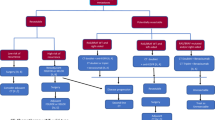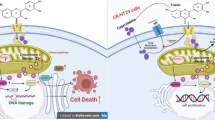Abstract
Purpose
Lung metastasis is the main cause of death in patients with colorectal carcinoma (CRC). Angiotensin II has been confirmed to facilitate cancer cell progression and metastasis. In this study, the possible anti-metastatic effects of an angiotensin II receptor type 1 (AT1R) antagonist, valsartan, have been investigated in an experimental CRC lung metastasis model.
Methods
An animal CRC lung metastasis model was used, involving intravenous injection of CRC cells. The experimental groups included (1) control group; (2) 5-FU (5-fluorouracil) group (5 mg/kg/every other day; ip); (3) valsartan group (40 mg/kg/day; po); and (4) valsartan + 5-FU group (combination group; valsartan 40 mg/kg/day, oral gavage, and 5-FU 5 mg/kg/every other day; ip). After 11 days, macroscopic and histological evaluations of lung tissues have been done for evaluation of lung metastatic nodules. In addition, inflammatory and angiogenic markers and oxidative stress index were measured in lung tissue.
Results
Our results showed that administration of valsartan especially in combination with 5-FU significantly reduced lung metastatic nodule and metastatic area (p < 0.05) in macroscopic and histological evaluations stained by hematoxylin–eosin. Measurement of inflammatory, angiogenic, and oxidative/antioxidative markers in lung tissue indicated that the level of IL-6, angiogenic markers (VEGF and VEGFR-1), and antioxidative markers significantly reduced in combination group (p < 0.05) while the MDA as a marker of oxidative stress increased (p < 0.05).
Conclusion
These results suggest that valsartan in combination with standard chemotherapeutic agents can have a synergistic effect in treatment of lung metastasis of CRC.





Similar content being viewed by others
Data Availability
The datasets during and/or analyzed during the current study are available from the corresponding author on reasonable request.
Code Availability
Not applicable.
References
Stella GM, Kolling S, Benvenuti S, Bortolotto C. Lung-seeking metastases. Cancers. 2019;11(7):1010-1018.
Braun MS, Seymour MT. Balancing the efficacy and toxicity of chemotherapy in colorectal cancer. Ther Adv Med Oncol. 2011;3(1):43–52.
Kuniyasu H. Multiple roles of angiotensin in colorectal cancer. World J Clin Oncol. 2012;3(12):150–4.
Chen X, Meng Q, Zhao Y, Liu M, Li D, Yang Y, et al. Angiotensin II type 1 receptor antagonists inhibit cell proliferation and angiogenesis in breast cancer. Cancer Lett. 2013;328(2):318–24.
Kinoshita J, Fushida S, Harada S, Yagi Y, Fujita H, Kinami S, et al. Local angiotensin II-generation in human gastric cancer: correlation with tumor progression through the activation of ERK1/2, NF-κB and survivin. Int J Oncol. 2009;34(6):1573–82.
Koh SL, Ager E, Costa P, Malcontenti-Wilson C, Muralidharan V, Christophi C. Blockade of the renin–angiotensin system inhibits growth of colorectal cancer liver metastases in the regenerating liver. Clin Exp Metas. 2014;31(4):395–405.
Amano H, Ito Y, Ogawa F, Eshima K, Suzuki T, Oba K, et al. Angiotensin II type 1A receptor signaling facilitates tumor metastasis formation through P-selectin–mediated interaction of tumor cells with platelets and endothelial cells. Am J Pathol. 2013;182(2):553–64.
Yacoub R, Campbell KN. Inhibition of RAS in diabetic nephropathy. Int J Nephrol Renovasc Dis. 2015;8:29–40.
Meier CR, Derby LE, Jick SS, Jick H. Angiotensin-converting enzyme inhibitors, calcium channel blockers, and breast cancer. Arch Intern Med. 2000;160(3):349–53.
Nakai Y, Isayama H, Ijichi H, Sasaki T, Sasahira N, Hirano K, et al. Inhibition of renin-angiotensin system affects prognosis of advanced pancreatic cancer receiving gemcitabine. Br J Cancer. 2010;103(11):1644–8.
Nakai Y, Isayama H, Sasaki T, Mizuno S, Sasahira N, Kogure H, et al. Clinical outcomes of chemotherapy for diabetic and nondiabetic patients with pancreatic cancer: better prognosis with statin use in diabetic patients. Pancreas. 2013;42(2):202–8.
Osumi H, Matsusaka S, Suenaga M, Wakatsuki T, Kumekawa Y, Ogura M, et al. Angiotensin II receptor blocker (ARB) may have a synergic effect in metastatic colorectal cancer (MCRC) patients treated with bevacizumab (BEV). Ann Oncol 2013; 24:iv34.
Arrieta O, Pineda-Olvera B, Guevara-Salazar P, Hernández-Pedro N, Morales-Espinosa D, Cerón-Lizarraga TL, et al. Expression of AT1 and AT2 angiotensin receptors in astrocytomas is associated with poor prognosis. Br J Cancer. 2008;99(1):160–6.
Arrieta O, Villarreal-Garza C, Vizcaíno G, Pineda B, Hernández-Pedro N, Guevara-Salazar P, et al. Association between AT1 and AT2 angiotensin II receptor expression with cell proliferation and angiogenesis in operable breast cancer. Tumour Biol. 2015;36(7):5627–34.
Beyazit Y, Purnak T, Suvak B, Kurt M, Sayilir A, Turhan T, et al. Increased ACE in extrahepatic cholangiocarcinoma as a clue for activated RAS in biliary neoplasms. Clin Res Hepatol Gastroenterol. 2011;35(10):644–9.
Roscioni SS, Heerspink HJ, de Zeeuw D. The effect of RAAS blockade on the progression of diabetic nephropathy. Nat Rev Nephrol. 2014;10(2):77–87.
Fujita M, Hayashi I, Yamashina S, Itoman M, Majima M. Blockade of angiotensin AT1a receptor signaling reduces tumor growth, angiogenesis, and metastasis. Biochem Biophys Res Commun. 2002;294(2):441–7.
Neo JH, Malcontenti-Wilson C, Muralidharan V, Christophi C. Effect of ACE inhibitors and angiotensin II receptor antagonists in a mouse model of colorectal cancer liver metastases. J Gastroenterol Hepatol. 2007;22(4):577–84.
Bangalore S, Kumar S, Kjeldsen SE, Makani H, Grossman E, Wetterslev J, et al. Antihypertensive drugs and risk of cancer: network meta-analyses and trial sequential analyses of 324 168 participants from randomised trials. Lancet Oncol. 2011;12(1):65–82.
Julius S, Kjeldsen SE, Weber M, Brunner HR, Ekman S, Hansson L, et al. Outcomes in hypertensive patients at high cardiovascular risk treated with regimens based on valsartan or amlodipine: the VALUE randomised trial. Lancet. 2004;363(9426):2022–31.
Yusuf S, Diener H-C, Sacco RL, Cotton D, Ôunpuu S, Lawton WA, et al. Telmisartan to prevent recurrent stroke and cardiovascular events. N Engl J Med. 2008;359(12):1225–37.
Ishikane S, Hosoda H, Nojiri T, Tokudome T, Mizutani T, Miura K, et al. Angiotensin II promotes pulmonary metastasis of melanoma through the activation of adhesion molecules in vascular endothelial cells. Biochem Pharmacol. 2018;154:136–47.
DiNorcia J, Moroziewicz DN, Ippagunta N, Lee MK, Foster M, Rotterdam HZ, et al. RAGE signaling significantly impacts tumorigenesis and hepatic tumor growth in murine models of colorectal carcinoma. J Gastrointest Surg. 2010;14(11):1680–90.
Li Y, Wang C, Li D, Deng P, Shao X, Hu J, et al. 1H-NMR-based metabolic profiling of a colorectal cancer CT-26 lung metastasis model in mice. Oncol Rep. 2017;38(5):3044–54.
Lee B-R, Islam MT, Park S-H, Jung H-i, Bae D-W, Kim T-H. Characterization of salicylic acid-mediated modulation of the drought stress responses: reactive oxygen species, proline, and redox state in Brassica napus. Environ Exp Bot 2019; 157:1–10.
Hashemzehi M, Naghibzadeh N, Asgharzadeh F, Mostafapour A, Hassanian SM, Ferns GA, et al. The therapeutic potential of losartan in lung metastasis of colorectal cancer. EXCLI J. 2020;19:927–35.
Benigni A, Cassis P, Remuzzi G. Angiotensin II revisited: new roles in inflammation, immunology and aging. EMBO Mol Med. 2010;2(7):247–57.
Medzhitov R, Horng T. Transcriptional control of the inflammatory response. Nat Rev Immunol. 2009;9(10):692–703.
Kitayama H, Maeshima Y, Takazawa Y, Yamamoto Y, Wu Y, Ichinose K, et al. Regulation of angiogenic factors in angiotensin II infusion model in association with tubulointerstitial injuries. Am J Hypertens. 2006;19(7):718–27.
Ahmadian E, Khosroushahi AY, Eftekhari A, Farajnia S, Babaei H, Eghbal MA. Novel angiotensin receptor blocker, azilsartan induces oxidative stress and NFkB-mediated apoptosis in hepatocellular carcinoma cell line HepG2. Biomed Pharmacother. 2018;99:939–46.
Lv J, Jia R, Yang D, Zhu J, Ding G. Candesartan attenuates angiotensin II-induced mesangial cell apoptosis via TLR4/MyD88 pathway. Biochem Biophys Res Commun. 2009;380(1):81–6.
Cortez-Retamozo V, Etzrodt M, Newton A, Ryan R, Pucci F, Sio SW, et al. Angiotensin II drives the production of tumor-promoting macrophages. Immunity. 2013;38(2):296–308.
Osumi H, Matsusaka S, Wakatsuki T, Suenaga M, Shinozaki E, Mizunuma N. Angiotensin II type-1 receptor blockers enhance the effects of bevacizumab-based chemotherapy in metastatic colorectal cancer patients. Mol Clin Oncol. 2015;3(6):1295–300.
Ohta T, Amaya K, Yi S, Kitagawa H, Kayahara M, Ninomiya I, et al. Angiotensin converting enzyme-independent, local angiotensin II-generation in human pancreatic ductal cancer tissues. Int J Oncol. 2003;23(3):593–8.
Fendrich V, Chen NM, Neef M, Waldmann J, Buchholz M, Feldmann G, et al. The angiotensin-I-converting enzyme inhibitor enalapril and aspirin delay progression of pancreatic intraepithelial neoplasia and cancer formation in a genetically engineered mouse model of pancreatic cancer. Gut. 2010;59(5):630–7.
Kosugi M, Miyajima A, Kikuchi E, Kosaka T, Horiguchi Y, Murai M, et al. Angiotensin II type 1 receptor antagonist enhances cis-dichlorodiammineplatinum-induced cytotoxicity in mouse xenograft model of bladder cancer. Urology. 2009;73(3):655–60.
Yanase K, Yoshiji H, Ikenaka Y, Noguchi R, Kitade M, Kaji K, et al. Synergistic inhibition of hepatocellular carcinoma growth and hepatocarcinogenesis by combination of 5-fluorouracil and angiotensin-converting enzyme inhibitor via anti-angiogenic activities. Oncol Rep. 2007;17(2):441–6.
Noguchi R, Yoshiji H, Ikenaka Y, Namisaki T, Kitade M, Kaji K, et al. Synergistic inhibitory effect of gemcitabine and angiotensin type-1 receptor blocker, losartan, on murine pancreatic tumor growth via anti-angiogenic activities. Oncol Rep. 2009;22(2):355–60.
Amaya K, Ohta T, Kitagawa H, Kayahara M, Takamura H, Fujimura T, et al. Angiotensin II activates MAP kinase and NF-kappaB through angiotensin II type I receptor in human pancreatic cancer cells. Int J Oncol. 2004;25(4):849–56.
Gong Q, Davis M, Chipitsyna G, Yeo CJ, Arafat HA. Blocking angiotensin II type 1 receptor triggers apoptotic cell death in human pancreatic cancer cells. Pancreas. 2010;39(5):581–94.
Funding
This study was supported by grants awarded by the Mashhad University of Medical Sciences.
Author information
Authors and Affiliations
Corresponding authors
Ethics declarations
Ethical Approval
All of the experiments were conducted in accordance with Mashhad University of Medical Science guidelines for animal experiments, and the Local Committee for Experiments with Laboratory Animals in Mashhad, Iran, gave their approval.
Consent to Participate
Not applicable.
Consent for Publication
All authors are aware of and agree to the content of the manuscript.
Conflict of Interest
The authors declare no competing interests.
Additional information
Publisher's Note
Springer Nature remains neutral with regard to jurisdictional claims in published maps and institutional affiliations.
Fereshteh Asgharzadeh and Niloufar Naghibzadeh equally contributed as first author to this study.
Rights and permissions
About this article
Cite this article
Asgharzadeh, F., Naghibzadeh, N., Hashemzehi, M. et al. Angiotensin II Receptor Antagonist, Valsartan, Has Beneficial Effect in Lung Metastasis of Colorectal Cancer Treated with Fluorouracil. J Gastrointest Canc 54, 126–134 (2023). https://doi.org/10.1007/s12029-021-00717-8
Accepted:
Published:
Issue Date:
DOI: https://doi.org/10.1007/s12029-021-00717-8




